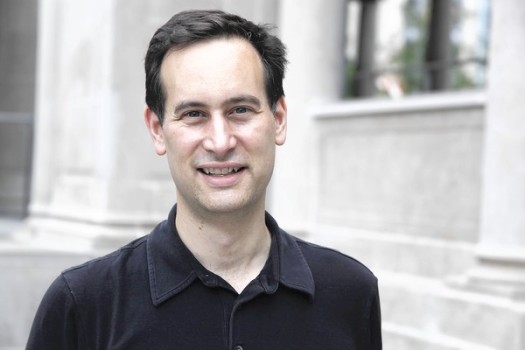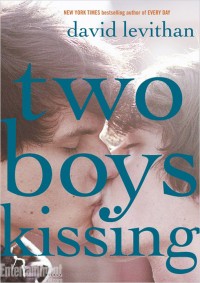Interview with David Levithan
 David Levithan is the author of numerous bestselling and award-winning young adult novels, as well as editorial director at Scholastic Press, where he co-founded the PUSH imprint. Levithan’s first YA novel, Boy Meets Boy, published in 2003, was a groundbreaking story in which gay teens lived in a completely accepting world. Boy Meets Boy won the 2003 Lambda Literary Award and was recently reissued in a tenth anniversary edition.
Among Levithan’s other novels are Nick and Norah’s Infinite Playlist, co-written with Rachel Cohn, which was made into a 2008 film; and Will Grayson, Will Grayson, co-written with John Green. Levithan also continues to write solo, including his 2012 novel Every Day, about a genderless teen who switches bodies — and thus genders — every day.
David Levithan is the author of numerous bestselling and award-winning young adult novels, as well as editorial director at Scholastic Press, where he co-founded the PUSH imprint. Levithan’s first YA novel, Boy Meets Boy, published in 2003, was a groundbreaking story in which gay teens lived in a completely accepting world. Boy Meets Boy won the 2003 Lambda Literary Award and was recently reissued in a tenth anniversary edition.
Among Levithan’s other novels are Nick and Norah’s Infinite Playlist, co-written with Rachel Cohn, which was made into a 2008 film; and Will Grayson, Will Grayson, co-written with John Green. Levithan also continues to write solo, including his 2012 novel Every Day, about a genderless teen who switches bodies — and thus genders — every day.
Levithan’s most recent novel is Two Boys Kissing, published by Alfred A. Knopf, a novel about two teen boys who attempt to set a world record for kissing. Two Boys Kissing was recently longlisted for the National Book Award. In our interview, Levithan talked about how LGBT YA has changed in the last decade, and why he wanted to put two boys kissing on the cover of his book of the same name.
Malinda Lo: It’s been a decade since your book Boy Meets Boy was published, and a lot has changed since then in YA with regard to LGBT characters. How would you compare today’s LGBT YA with what came out ten years ago? What do you think the biggest change has been?
David Levithan: So much has changed! I think many of us have broken free of the misery plot that was prevalent in LGBT YA – which is not to say that the misery plot is in any way invalid or nonreflective of some LGBT teens’ experience. But for so long, it was the only plot being offered (with some notable, rare exceptions), and that’s not the case now at all.
On the publishing side, there’s no hesitation about LGBT YA anymore. None. There were still some people who were nervous about it when Boy Meets Boy came out (along with Keeping You a Secret, Geography Club, Rainbow Boys, Empress of the World, Kissing Kate, and other books in the 2002–03 wave.) That’s not the case now. And that in turn emboldens authors to try different things, and break more ground.

ML: Though the narrators in Two Boys Kissing are unnamed, they appear to represent the generation of gay men who came of age in the 1980s (and maybe earlier), during the height of the AIDS crisis. This was really moving to me and reminded me of what a crucible that time was for the gay male community. Why did you choose to write the book this way?
DL: The voice of the book started in a short story I did for Michael Cart’s collection How Beautiful the Ordinary. Michael asked me to write something about contemporary LGBT teens, and because I didn’t know what the other contributors to the anthology were going to do, I tried to think of an angle that would give a different perspective. And I thought the near-history of AIDS was something I hadn’t really written about, and wanted to write about, in no small part because my uncle Bobby has lived with AIDS for over 25 years now. I feel my gay generation is really a hinge generation that only lasted a few years — between the first wave of AIDS devastation and the first wave of the Internet. And I liked the idea of using that hinge to some effect — trying to see how the generation above mine would see the generation below mine, and in doing so paint a picture of how it was then and how it is now.
 ML: The cover for Two Boys Kissing has generated a lot of discussion. I know you were involved in this cover, because the photo was acquired through your own readers. What were your goals and motivations in selecting this image for your book?
ML: The cover for Two Boys Kissing has generated a lot of discussion. I know you were involved in this cover, because the photo was acquired through your own readers. What were your goals and motivations in selecting this image for your book?
DL: The book is called Two Boys Kissing and, because of this, I wanted it to have two boys kissing on the cover. Because, even now, that has such power, and that power is partly what the book is about. Random House was all for it, and I asked Evan Walsh, a photographer I knew from Facebook, if he wanted a shot at it. He was a senior in high school at the time, and got two friends and captured the perfect shot. The goal was to capture the spirit of the book as much as possible. And I feel he did.
ML: Were you concerned that this book cover might limit its readership? I’ve seen some discussion of the idea that gay teens might be afraid to check it out for fear of bullying, for example. And then of course there’s the possibility of people challenging the book.
DL: The funny thing is, the same concerns were voices about the Boy Meets Boy cover ten years ago. The thought being: Would a closeted kid really walk around with a book that had three hearts on the cover? And the answer is: the kids found the book and read the book. Because (a) most of them read in private, far from bullies and everyone else, (b) if they didn’t feel comfortable taking it out of the library or buying it in a bookstore, they had friends (mostly girls, but sometimes parents or siblings) who would do it for them, (c) librarians are brilliant about getting books to the kids who need them, even if it means knowing a book will be “stolen” or “borrowed” without being taken out, (d) the great thing about a hardcover is you can always switch the cover or take it off, and (e) on ebook, no one can see the cover anyway.
But more than that — much more than that: Even for the kids who don’t feel comfortable taking it out of the library or buying it in the bookstore yet, they know it’s there. They know they are represented. If you see that book in your library or in your bookstore or at your friend’s house you know that there is part of you that belongs there, and is accepted. There is such power in that. I know there’s worry about kids who might be ashamed of being seen with an “out” book with an “out” cover — but that is far outweighed by the kids who take pride in it, or find some sort of meaning through it.
As for challenges and censors: the book is called Two Boys Kissing. It is about two boys kissing. Why hide that? What good would that do? The people who are going to object to two boys kissing on the cover were going to object to the book from the moment I typed the first sentence. They can argue it all they want. They will always be wrong.
ML: You told The Atlantic Wire, “It’s not that we don’t want to publish lesbian Y.A. or gay characters of color, but the majority of submissions we get are about middle-class white gay boys. We are actively searching for new voices who can tell different stories. We’re not there yet, but not for lack of trying.” Can you say a bit about how you are actively searching for these new voices?
DL: It’s by getting the word out whenever possible. Whether in interviews like that one (or this one), or when talking to agents, or when out on tour. It’s working with other authors to scout new authors, not just in MFA programs, but wherever we go. It’s mentoring young writers when the chance arises. Whenever I am asked, as an editor, what I am looking for, that is usually my answer. The bar is still high, as it is for any submission. But the door is wide open.
(And, I’ll hasten to add, if you’re a high school student, you should absolutely enter your work into the Scholastic Art & Writing Awards — www.scholastic.com/artandwriting — there is a novel contest that I run through the PUSH imprint at Scholastic, as well as many other art and writing categories, and they are open to a wide diversity of voices and modes of expression.)
ML: What would you say to writers who are writing L, B, T and queer characters of color, but who see few of those books being published?
DL: Write the book that you want to see out in the world. That’s certainly what I did with Boy Meets Boy and Two Boys Kissing. Don’t think about the marketplace, or that publishers won’t want what you’re writing. If it is good, they will. Don’t hold back. Just write it, and focus on writing the best book possible.
Two Boys Kissing is now available. Find out more about David Levithan at his website, or follow him on Twitter @loversdiction.
>>>
Want to win four of David Levithan’s novels, Two Boys Kissing, Boy Meets Boy, Every Day and Invisibility (co-written with Andrea Cremer)? Enter the Giant YA Pride 2013 Giveaway!